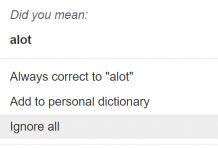 English teachers and other grammarians have long complained about the prevalence of texting abbreviations causing a corruption in the grammar of our youth. But I think there may be a more pressing new-media threat to proper grammar: desktop publishing.
English teachers and other grammarians have long complained about the prevalence of texting abbreviations causing a corruption in the grammar of our youth. But I think there may be a more pressing new-media threat to proper grammar: desktop publishing.
Think about it. In the old days, when you wanted to put a “No admittance” or “Authorized personnel only” sign up, you had to pay a fairly large sum of money to have it fabricated. When you were paying that much money, and getting a permanent artifact in return, you (and the artifact makers) would make damned sure that everything on it was right.
 But now, that kind of sign is made through the virtues of desktop publication…and without as much care taken. The first four signs in this article are all hanging at my place of employment in one place or another. Not on the main work floor (where cameras are not permitted, or I couldn’t have taken the photos), but in the entrance (not “enterance”) and breakroom areas. They’ve all been hanging there for days at least, without any changes. It seems likely they’ll continue to hang there for the conceivable future.
But now, that kind of sign is made through the virtues of desktop publication…and without as much care taken. The first four signs in this article are all hanging at my place of employment in one place or another. Not on the main work floor (where cameras are not permitted, or I couldn’t have taken the photos), but in the entrance (not “enterance”) and breakroom areas. They’ve all been hanging there for days at least, without any changes. It seems likely they’ll continue to hang there for the conceivable future.
 After all, it’s not really worth anybody’s time to hunt down the person to whom to complain about them. (Certainly hasn’t been worth mine, for all that I was raised by English majors to have the grammatical equivalent of “perfect pitch.”) I imagine lot of people don’t even notice anything is wrong with them.
After all, it’s not really worth anybody’s time to hunt down the person to whom to complain about them. (Certainly hasn’t been worth mine, for all that I was raised by English majors to have the grammatical equivalent of “perfect pitch.”) I imagine lot of people don’t even notice anything is wrong with them.
And even if someone did, would it be worth the time of the people who made the signs to go back, remake them, laminate them, and re-hang them? Anyone who sees them knows what they mean, even if they’re not spelled quite right, and those people have other demands on their time—it’s a busy place.
 And in this way our tolerance to bad spelling and grammar increases, and perhaps people who don’t know any better see the signs and assume that’s the way it’s supposed to be spelled, since clearly nobody’s bothered to change it. The good-enough is the enemy of the perfect.
And in this way our tolerance to bad spelling and grammar increases, and perhaps people who don’t know any better see the signs and assume that’s the way it’s supposed to be spelled, since clearly nobody’s bothered to change it. The good-enough is the enemy of the perfect.
Of course, desktop publishing signs aren’t the only place to find typos and bad grammar. Today I was out at a local arts fest, sampling beers from a local microbrewery, Mother’s Brewing Company, and examining the (apparently professionally-printed) stand-up signs talking about their beer. I happened to notice that one of these beers, in particular, offered “hints of frit.” So I asked the microbrewery staff serving it exactly what “frit” was. “I was in a hurry,” one of them explained embarrassedly. Of course, they used the sign anyway. (But I’m mostly willing to forgive them because they have some very nice beer.)
 And on my peanut butter jar the other day, I noticed something else that suggests I need to be careful what individuals I allow near it. After all, it “contains peanut products which may be allergic to some individuals.” I certainly wouldn’t want those peanut products to get sick. (Though, to be fair, this is on a product imported from Argentina. Perhaps the grammatical construction of the Spanish language is to blame.)
And on my peanut butter jar the other day, I noticed something else that suggests I need to be careful what individuals I allow near it. After all, it “contains peanut products which may be allergic to some individuals.” I certainly wouldn’t want those peanut products to get sick. (Though, to be fair, this is on a product imported from Argentina. Perhaps the grammatical construction of the Spanish language is to blame.)
 In a way, I suppose this mirrors the complaint that some have about self-published books: when it’s so cheap and easy to publish, it’s much easier for errors to creep in. There’s not the incentive to spend the extra time and money to make sure everything is correct. But then again, judging by the quality of some commercially-produced e-books, there doesn’t seem to be much incentive to spend that extra time and money there, either.
In a way, I suppose this mirrors the complaint that some have about self-published books: when it’s so cheap and easy to publish, it’s much easier for errors to creep in. There’s not the incentive to spend the extra time and money to make sure everything is correct. But then again, judging by the quality of some commercially-produced e-books, there doesn’t seem to be much incentive to spend that extra time and money there, either.
(And as a side note: it’s one of the physical laws of the Internet that any post complaining about spelling or grammar will have at least one spelling or grammar mistake in it itself. I’m willing to stipulate that such an error probably exists in this one, so just take it as read and don’t rub my nose in it if you find it, okay?)
































